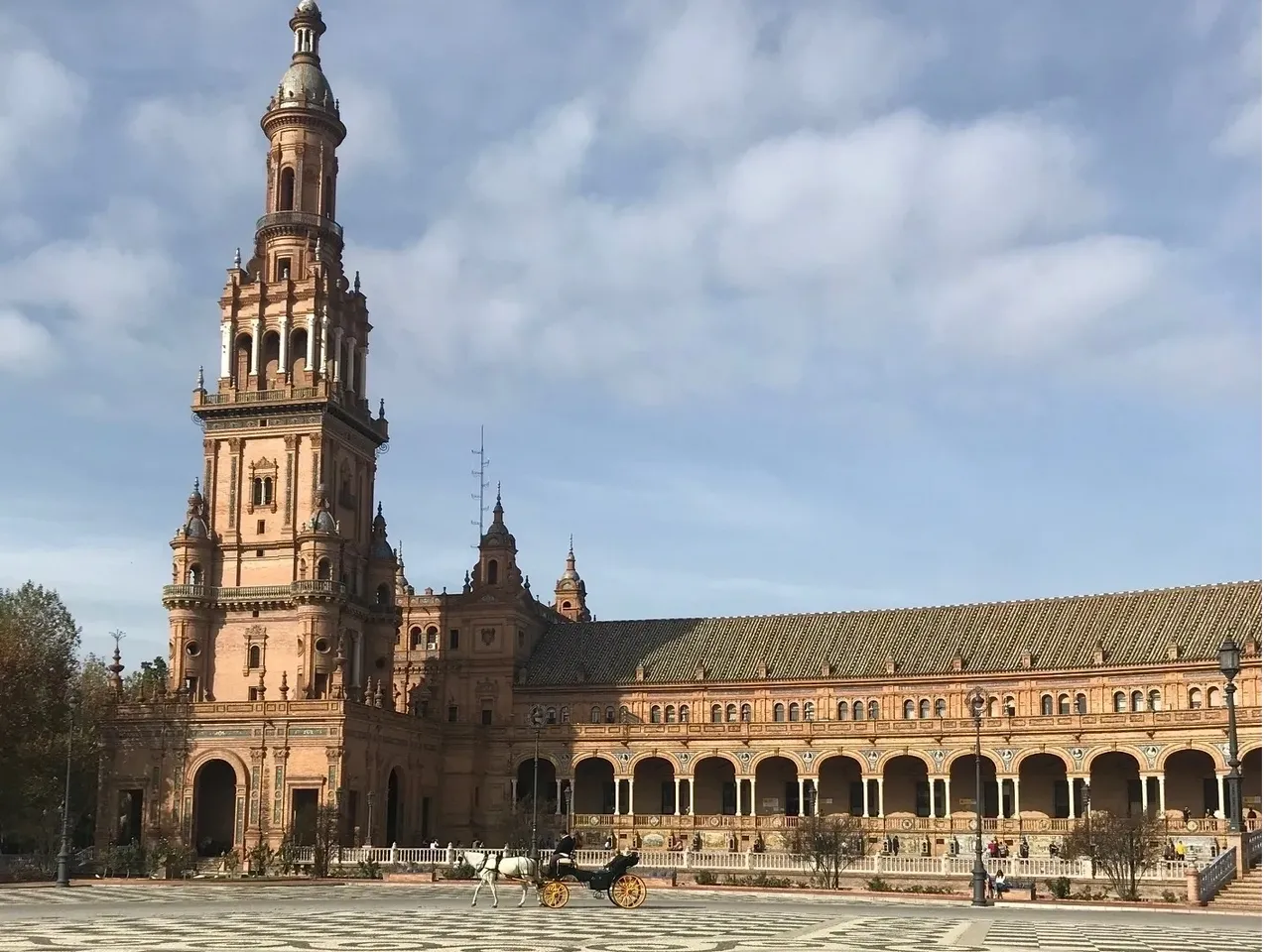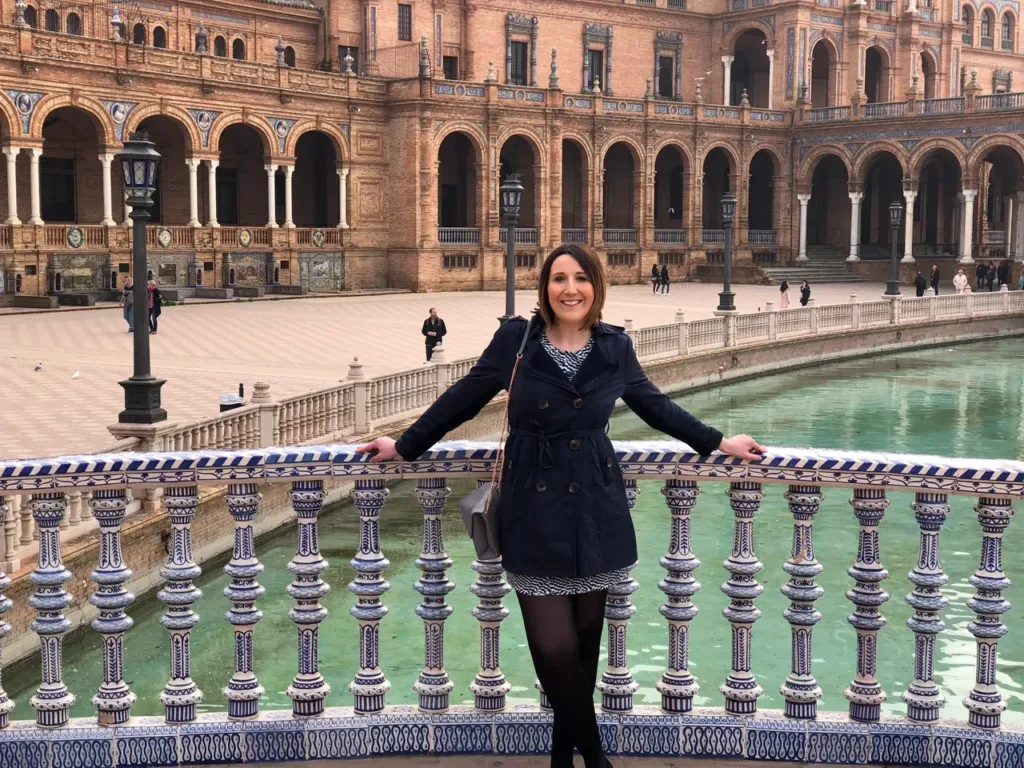Dr Charlotte Russell, Clinical Psychologist & Founder
One of the warmest and sunniest cities in Europe, and brimming with food, wine, culture and history, Sevilla is hard to beat for a city break. Just like my adopted hometown of Manchester, it has everything but a beach! Sevilla is the fourth largest city in Spain and the capital of the Andalucía region, famous for tapas and flamenco.
Sevilla is great if:
· You’re open to experiencing the Andalucían food and culture
· You like to explore on foot
· You want to try out speaking Spanish – I find the locals here are very friendly and patient and its so lovely to connect through language.
· You want a nice mix of quiet days exploring and evenings with a bustling-but-not-too-busy vibe in the local bars and restaurants.
· You need some space to reflect
Things to do in Sevilla
La Plaza de España
No Sevilla guide would be complete without it, La Plaza de España is truly breath-taking and such a relaxing place to spend a couple of hours. Even though it can become very busy at times, in my experience it is usually possible to find a quiet spot somewhere and just take it all in.
The Plaza was built in 1929 to mark the Ibero-American Exposition World’s Fair. The aim as I understand it, was to enhance the image of Sevilla and strengthen relationships with countries within the Americas. It scored a big thumbs up on both counts and the Plaza de España is certainly the emblem of Sevilla.
You will find representations of the different regions of Spain which is interesting. The different identities of each region really come though and you get a flavour of how diverse Spain really is.
La Plaza is situated in Maria Luisa Park which is very pretty and full of orange trees. It’s worth allowing yourself time to explore both. I often find that the park is much quieter than the Plaza itself. If you have time I would recommend taking a picnic and a book, especially if you are visiting in the warmer months. Let’s face it, that is most of the time especially compared to the UK!

Eat tapas at Calle Mateos Gago
This street is lined with tapas bars and having tried most of them, I wouldn’t hesitate to recommend that you try any one of them! As is the case in most of Spain, food and wine are generally delicious and reasonably priced.
One of the most fun things to do is to visit a few of the restaurants and share 2 or 3 dishes from each one. One of my most lasting memories of Sevilla is the size of goat’s cheese portion that you get in many of the tapas bars. In the UK if you order goat’s cheese anywhere it is usually pretty measly. In Sevilla they seem to give you a whole wedge of goat’s cheese. As you can probably tell it gets a huge thumbs up from me!
If you eat meat then you have to try the Iberico ham. This is usually freshly sliced onto a plate known a ration or ‘una ración’ in Spanish. If there are two of you a half ration is usually sufficient. My recommendation for this is a tiny bar on Calle Mateos Gago called ‘Alvaro Peregil’. It’s very recognisable due to the yellow and blue tiles inside and outside. This place is very traditionally Spanish so don’t expect it to be fancy, but is the best choice if you are wanting to try the iberico in the most authentic way.
From a veggie point of view a tomato salad is always a good choice. In Andalucía many places serve fried aubergines fried with honey, which is also a nice dish.
My favourite drink with tapas is Cava, especially Cordorníu, which you can buy in small 200ml bottles known locally as a ‘Benjamin’ (pronounced Ben-ha-min). Mr Travel Psychologist enjoys a local beer or glass of red wine so everyone is happy.
You will probably have the option of sitting outside to eat whatever time of year you visit. I have visited in November and December and it was find to sit outside – many restaurants have heaters on their terraces.
Flamenco, Flamenco, Flamenco
The art of Flamenco consists of music played by guitar, singing and dancing. The street performers in Sevilla are often good and will give you an idea of what to expect but I’d recommend going to a scheduled performance.
In my opinion Sevilla is one of the most perfect city breaks because of the sights in the daytime and the flamenco in the evening. You can spend your days exploring and enjoying the sun, then in the evening head out for drinks, flamenco and then dinner. It doesn’t get better than that!
The Spanish term ‘duende’ refers to the feeling that you experience when you really connect with the emotion and expression in a flamenco performance. I think its probably easier to experience then to explain in words!
If its your first experience of Flamenco then I’d recommend La Casa del Flamenco which is very close to the Cathedral and main tourist areas. The show is very polished and I have enjoyed it very much each time I’ve been.
If you’re looking for an experience that feels a little more authentic, head over the river to the Triana district and to Baraka sala Flamenca. The experience here is perhaps a little less polished, but in my opinion feels more authentic, and you´re more likely to be able to connect with the ‘duende’. While you’re over in Triana you can check out the market, and one of the many local bars that have a traditional feel to them.
To learn more about Flamenco visit the The Flamenco Dance Museum. The museum has a variety of interactive and interesting displays and provides a deeper understanding of the performances as well as the history. It explains the different themes and emotions that are portrayed in flamenco performances. I certainly found this interesting as a psychologist.
The museum also hosts performances and offer a combined ticket which includes entry and a ticket for the show. I haven’t taken this option myself but I imagine that it would be good.
Las Setas
The metropolitan parasol of Sevilla known locally as Las Setas (‘The Mushrooms’) is a wooden structure, shaped like a mushroom. It was built in 2011 and is around 29 metres high. The height means that there are great views over the city so it is lovely to go up there on a sunny day. It’s also a little bit different! I wouldn’t say that it was my favourite sight but I think worth it if you want to see the views.
La Catedral
The biggest Gothic Cathedral in the world, the Catedral de Sevilla was reportedly built to be so beautiful that anyone who saw it would be in a state of disbelief. It is certainly pretty spectacular and its very difficult not to be in awe of its beauty. Finished in 1507, the building has both Christian and Moorish influence, which reflects the history in the Andalucía area more generally. You can find out more about the history here.
The Catedral is home to the tomb of Christopher Columbus. As you might expect, the area around the tomb is very highy decorated and worth seeing for that alone.
It was named a UNESCO World Hertiage site in 1987. As you might expect it gets very busy and so it is absolutely essential to book in advance.
Alcázar de Sevilla
The Real Alcazar of Seville is another interesting place to visit and includes beautiful buildings, courtyards and stunning gardens. Despite being in the middle of the city, there is a definite quietness to this place.
Last but not least:
If you’re feeling hedonistic – have a ‘meal’ by eating tapas in several restaurants over a few hours, picking the tastiest dishes on each of the menus.
If you want a sense of accomplishment – Climb the steps to the top of the ‘Giralda’, the Bell Tower of the Cathedral. The climb is almost 100 metres high so make sure you prepare yourself!
Reasons to feel optimistic – In recent years, Ryanair have started to fly directly to Sevilla from Manchester, so if you live in the North of England its almost too easy to get there!
Where to stay in Sevilla
This section contains affiliate links. This means if you book through the links provided this blog will receive a small commission, at no cost to you.
I have visited Sevilla many times and have stayed in several hotels. These are my favourite:
Hotel Alcántara which is conveniently located next to La Casa del Flamenco. This is a fairly basic hotel but the location does not get better than this! I found the room to be clean, comfortable and quiet. When I stayed here I was travelling solo and felt safe as a woman on my own. Staff were very friendly and accommodated my attempts at Spanish!
For a little more luxury check out Hotel Rey Alfonso X in which is located literally meters away from Hotel Alcantara. Both are right the heart of the city in the Santa Cruz district, perfect for exploring. The rooms here are big and luxurious. The other huge advantage is that the hotel has a rooftop bar and small pool, which is great in the summer months. The only downside is that the breakfast is a little pricey so if a coffee and pastry is sufficient for you, it will be cheaper and perhaps preferable to eat in one of the many cafes locally.
On my last visit I stayed at Alcazar de Maria which also has an amazing location near the Catedral. This is a little boutique hotel with breakfast included – very traditionally Spanish in their lovely (enclosed) courtyard area. You will need to speak a little Spanish to order breakfast here. Below is a picture of ‘huevos revueltos’ served at the hotel. Rooms are small but comfortable and clean. I’d definitely stay here again!
If you liked this article check out My top 10 things to do in Spain
Please note our destination guides contain personal recommendations and not professional advice

